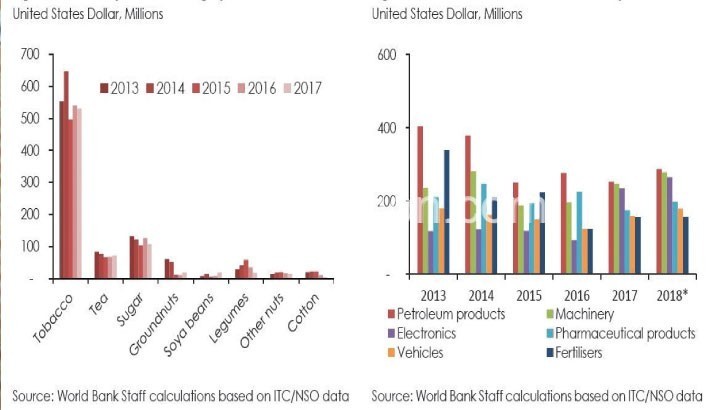Negative trade balance worsens
Malawi continues to experience negative trade balance, with imports surpassing exports due to insatiable appetite for foreign goods and continued reliance on imported inputs for production, latest figures from NSO show.
National Statistical Office (NSO) figures show that between 2017 and 2018, negative trade balance has more than doubled to K2.7 trillion from K1.2 trillion, a sign that the country is still embracing imports more than locally produced products.

During the review period, petroleum, unused stamps, fertiliser, motor cars and medicines topped the import list while tobacco, tea, oil cake, sugar and soya beans topped the export list.
The surge in imports comes on the back of the country having strategies such as National Export Strategy (NES), Malawi Growth and Development Strategy (MGDS) and Buy Malawi Strategy to ensure import substitution.
In the MGDS III, for instance, government plans to narrow the trade deficit in the next five years to to two percent of gross domestic product (GDP) in 2022 from 2.5 percent in 2018.
During the same period, exports of goods and services are expected to decline from 28.3 percent of GDP in 2018 to 27.2 percent of GDP in 2022 while imports of goods and services are expected to decline to 36.9 percent of GDP in 2022 from 41.4 percent in 2018.
However, looking at the trend, this feat seems to be a far-fetched dream.
But as World Bank country economist Priscilla Kandoole observed in the November 2018 Malawi Economic Report, private sector growth has not responded positively due to intermittent power supply and a challenging business environment since 2017.
Trade analysts have since faulted the structure of the economy, observing that it makes local products suffer high production costs resulting in cheaper imports.
In an interview on Tuesday, Malawi Confederation of Chambers of Commerce and Industry (MCCCI) chief executive officer Chancellor Kaferapanjira said government has paid no attention to the private sector to create a conducive environment for production.
“We are not exporting anything because we are failing to produce. In the end, the economy will lose out on jobs and foreign exchange,” he said.
National Working Group on Trade Policy chairperson Frederick Changaya said the country exports cheaper commodities while importing value added products which enjoy stable rising prices.
But Minister of Industry, Trade and Tourism Francis Kasaila in an interview on Tuesday said while the available strategies need a buy in from all Malawians, their success require concerted efforts from all stakeholders.





